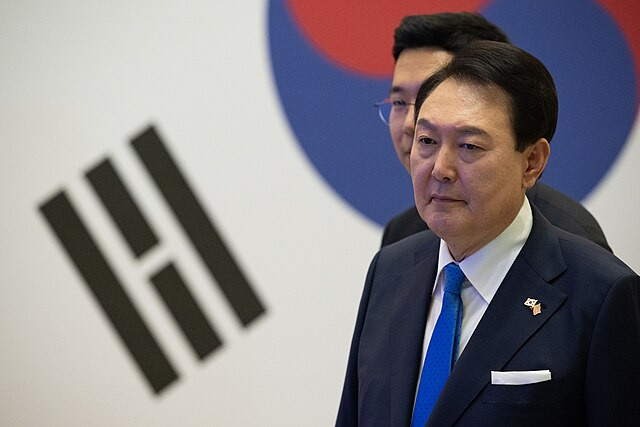Former South Korean president Yoon Suk Yeol appeared in a Seoul courtroom Monday to face charges of rebellion, marking the first criminal trial of an ousted president in the nation's history stemming from a declaration of martial law during a December budget standoff. The trial, which could span several years, centers on allegations that Yoon orchestrated an unlawful deployment of military forces to suppress democratic institutions.
The Seoul Central District Court formally opened proceedings by reading the indictment. Yoon, 64, entered the building via an underground parking lot to avoid media exposure, according to Yonhap news agency. The former leader faces charges of rebellion, which carry either life imprisonment or the death penalty under South Korean law. Although capital punishment remains on the books, no executions have occurred since the late 1990s.
Yoon was impeached and removed from office by the Constitutional Court on April 4, just days after the National Assembly voted to oust him. The court ruled that his actions had "betrayed public confidence" and caused widespread disruption in "society, economy, politics, diplomacy and all other areas."
In December, Yoon ordered troops into central Seoul, targeting the National Assembly and election commission offices during a political impasse over the national budget. The martial law decree included a suspension of all political activities in parliament, effectively attempting to paralyze legislative functions. Yoon has defended the move as a peaceful effort to raise awareness of what he called "anti-state" behavior by the opposition, which he accused of using its legislative majority to obstruct his agenda.
"The fact that they built a rebellion charge over an event that lasted only a few hours and was resolved non-violently after the National Assembly's demand to lift the measures was immediately accepted ... doesn't align with proper legal reasoning," Yoon said Monday in court, according to Yonhap.
Prosecutors argue that Yoon's directive was an illegal attempt to dismantle constitutional order. Witnesses, including senior military officials, are expected to testify that Yoon ordered soldiers to forcibly remove lawmakers from the National Assembly to prevent a vote repealing martial law. Yoon has denied this and claims he always intended to respect the parliamentary process.
Legal analysts say the court must determine whether Yoon's actions reflected intent to overthrow democratic institutions or whether they fell within a more ambiguous emergency context. The court will focus on "determining whether there was an intent to undermine constitutional order, and individually assess a broad range of specific actions, including the circumstances under which the military and police forces were deployed," said Yang Hong-seok, a Seoul-based attorney.
Park SungBae, a criminal law expert, said a conviction on rebellion charges is highly likely given the Constitutional Court's findings. However, Park added the full trial could take one to two years due to the volume of witnesses and documentation. If appealed, the case could reach the Supreme Court, but Park believes a final verdict across all levels of court would likely arrive within three years.
Yoon, who no longer enjoys presidential immunity, could face additional charges including abuse of power depending on the trial's outcome. His removal has triggered a snap presidential election scheduled for June 3, and observers say he could influence his party's choice of candidate in hopes of securing a future pardon.
In a message to supporters last week, Yoon pledged to "continue to do my utmost" to build "the free and prosperous Republic of Korea that we have dreamed of together."




